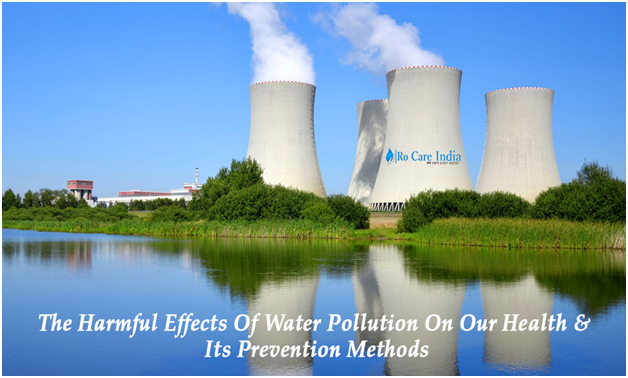Water is the primary source of life on this planet. You can live without food for seven days but not without water. However, we humans are not trying to understand the value of pure drinking water; instead, we are polluting it with unwanted materials.
The leading cause of water pollution is when unwanted materials like industrial waste, animal waste, human waste or garbage, sewage effluents are released into the water bodies. These effluents change the quality of water, thus making it harmful for the environment as well as for human health. Waterborne diseases are caused by polluted water formed due to deterioration of animal and human waste into the water.
This polluted water is the reason for numerous waterborne diseases. When human beings drink or eat food that is either washed or made up of this contaminated water becomes the victim of deadly diseases.
The polluted water contains protozoa that cause a lot of infections such as Amoebiasis, toxoplasmosis, Giardiasis, etc. It also contains deadly viruses like Hepatitis A or E and contains bacteria that causes E.coli, typhoid fever, or cholera. Water that is infected with parasites like roundworm, ringworm, and hookworm causes diseases like Ancylostoma ceylonicum, fungal infection on the skin, Eating Ascaris eggs, etc.
Is The Issue Of Water Pollution Big And How?
As per reports by the World Health Organization (WHO), over 80{7e0259aaa3060fed66852291a7d473d02e5444f60b251106bbd92dbe50858870} of diseases that human beings are infected are waterborne. More than 3.1{7e0259aaa3060fed66852291a7d473d02e5444f60b251106bbd92dbe50858870} of deaths occur due to the germ-infested and poor quality of water.
In India, more than one lakh people die every year due to waterborne diseases. According to the latest report, it is found that the groundwater in one-third of India’s 600 districts is not fit for drinking as they are contaminated. The water there contains a concentration of fluoride, salinity, iron, and arsenic beyond the tolerance levels.
More than 65 million people have been suffering from diseases like fluorosis; a crippling condition caused due to a high amount of fluoride intake, which is very common in the Rajasthan belt.
A World Resources Report stated that around 75 percent of India’s water supply is extremely polluted with sewage wastes. According to reports by the United Nations, India’s water quality is inferior right now. and it ranks 120th among the 122 nations in terms of poor quality of the water accessible to its residents.
Waterborne Diseases Are Caused Due To Two Main Reasons
-
Pollution
Due to the release of dangerous chemicals, nitrates, and heavy metals into the water supply by industries and the over-use of agricultural chemical compounds.
-
Dirt and Contamination
Due to the excessive contamination into the water supply, it is being affected by numerous viruses, bacteria, and parasitic organisms, which in turn causes serious diseases. Most of the pollution is by water coming into contact with human and animal waste. Do you know even one gram of feces can comprise over 100 billion microbes?
There are a lot of waterborne diseases starting from diarrhea, cholera to meningitis. They can be extremely severe, and life-threatening to the patients that are infected by these diseases. However, some measures can be taken to protect yourself and your family from waterborne diseases and illnesses.
Some Of The Waterborne Diseases Are
-
Dysentery
The main reason of dysentery is due to either bacteria or protozoa. This illness causes inflammation of the intestines, unbearable pain in the abdominal and often causes diarrhea with blood. The intestinal lining is affected, impairing its nutrient absorption capacity. This causes bleeding and allowing the bacterial infections and even pathogens to enter into the bloodstream.
-
Typhoid fever
The life-threatening typhoid fever is caused due to the bacteria known as Salmonella Typhi. One can get this illness due to eating of food that is handled by someone shedding the Salmonella Typhi bacteria. Even by eating food that is washed with sewage-contaminated water containing the typhoid bacteria.
Once ingested, the bacteria keep on multiplying in the bloodstream. Some of the symptoms are very high fever, headache, loss of appetite, stomach pain, extreme fatigue, and joint pain. At times, rashes spread across the abdomen known as rose spots.
-
Cholera
Cholera is a severe, diarrheal disease that causes infection in the intestine. The bacterium Vibrio Cholerae causes this. Cholera has increased globally at a steady rate since 2005. This is generally caused due to fecal contamination of water supplies or via the street vendor foods. This may cause the patient profuse watery diarrhea, leg cramps, and vomiting. The rapid loss of body fluids can lead to severe dehydration and shock. Patients without proper treatment can even die within hours.
-
Hepatitis A
Hepatitis A is a severe disease that affects the liver and is caused by the hepatitis A virus. The virus usually enters the water supply through the feces of a diseased person. This can take place via broken pipes or by sewage overflows. Consequently, the infection can spread through water that is used for washing utensils and food items. Hepatitis A usually causes high fever, vomiting, abdominal pain, jaundice or yellowing of the eyes and skin, dark urine, and weakness.
-
Trachoma
Trachoma causes visual impairment or blindness. It is a contagious disease that spreads through personal contact with the infected person. It is caused by flies that have been in connection with the discharge from the body of an infected person.
-
Shigellas
Shigella is another contagious disease that can quickly spread from the infected person. Shigellas and the E.coli bacteria both cause traveler’s diarrhea. This often occurs by eating salad, sandwiches, or any other food items that have involved hand contact by a person. Who is infected with the bacteria and not washed their hands properly?
Some Of The Prevention Measures That One Can Follow
- Always make sure that the water you are using is visibly clean and is free from any sand and silt. It is advisable to filter the water and get rid of any dirt.
- Only drink filtered and safe water. You must use clean potable water or water treated with water purifiers. Do not drink untreated water. You can purchase water purifiers for your house to make sure you and your family are having safe drinking water. Some of the best electric water purifiers in India nowadays are Kent Grand Plus, Livpure Pep Pro Plus, and Havells Max.
- Always make sure that the water you store is free from germs and clean for later use. Use some antiseptic liquid in the water that you use for bathing and later, if you find it is nor clean. This will kill the harmful bacteria present in the water.
- Hand hygiene is a must. It can be done by washing hands meticulously with liquid soap before and after cooking food, after using the toilet, and before eating or drinking anything. Parents should see to it that their children always wash their hands when they enter the home after playing games outside. Also, even adults should wash hands while entering the house.
- Always make sure that the food items are appropriately washed and are cooked thoroughly to get rid of dangerous bacteria and other hazardous microbes.
- Immunize yourself and your family with proper vaccinations to safeguard from diseases like Hepatitis A, Typhoid, Polio, etc.
- As far as possible, always try to make use of disposable plates and glasses while eating or drinking from outside, to avoid contagious diseases.
- Avoid having previously prepared food that is exposed outside for long hours.
- Get your water treatment devices such as filters, RO unit, etc. regularly serviced and maintained by having a proper AMC from a good company.
Waterborne infections can gulp you anywhere, but they are usually more dominant in rural areas. Mainly due to poor infrastructure, poor sanitation, less availability of safe and clean drinking water, open drains, etc.
Waterborne illness can have a severe impact on young children and babies. However, elderly persons, those who suffer from chronic health conditions like heart disease, diabetes, kidney disease must follow more safety measures to prevent themselves from these severe diseases.









